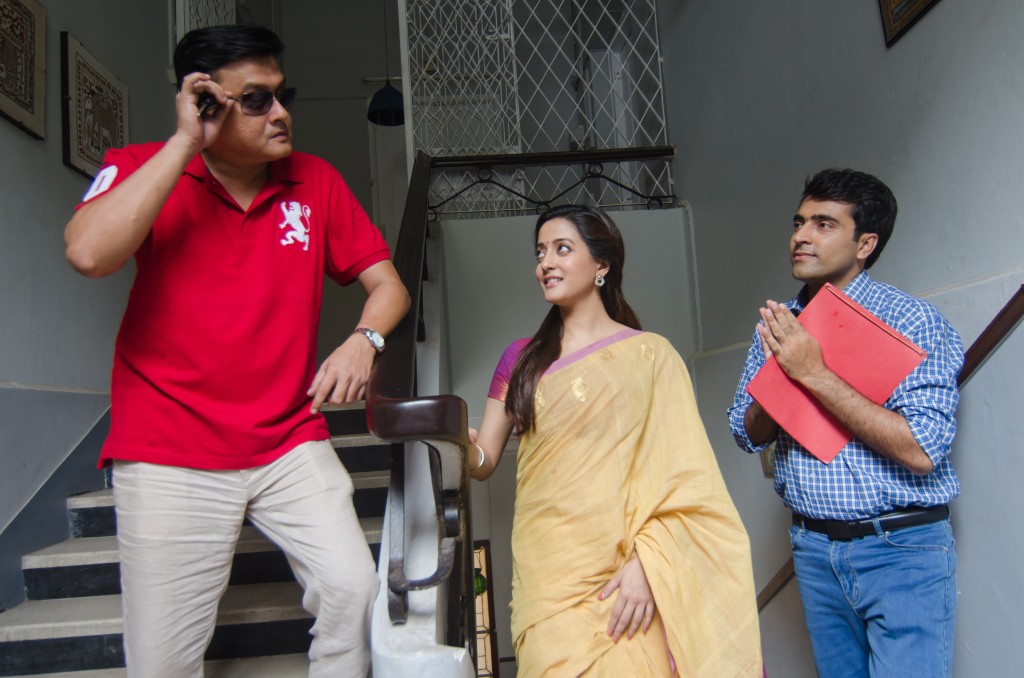Monchora is a romantic family drama filled with humor, satire, intrigue and love centered on an old man surrounded by colourful characters with their personal axes to grind. Among them is an out-of-the-box thief, who steps into the family with the job of a ‘secretary’ and slowly falls in love with the old man’s grand-daughter who reciprocates his feelings. But his shady background fails to get him a clean chit from his lady-love who suspects him at every turn. What happens when a theft is discovered and suspicion points at the gentleman thief?
Based on a story by Saradindu Bandopadhyay, this non-Byomkesh adventure is designed to be a no-holds-barred entertainer that has conventional ingredients of a mainstream film including violence, but excluding an item number. Jadunath (Paran Bandopadhyay) is an aged head of an aristocratic family who lives with an old retinue Sevak and his two grandchildren, Nanda (Raima Sen) and Manmatha (Saswata Chatterjee). He is a strict disciplinarian who believes that everyone should be back home by ten but Manmatha hoodwinks him every night shielded unwillingly by Nanda and Sevak. He is having a torrid affair with the diabolically shrewd shrew, Lily (June Maliah), who has devious plans of looting him and his family of the family heirloom, a priceless, giant-size ruby that is also the family deity.
The relative peace of the family is disturbed when Dibakar, (Abir Chatterjee) a desperately hungry thief, enters one night, bites off a piece from a prawn cutlet but manages to slip away with the help of Nanda who interrogates him to learn that he is forced to thieve because he is unemployed, an orphan and cannot get a job with his limited education. The next morning, on Nanda’s advice, he decks himself up and approaches Jadunath with his horoscope to get his future told because Jadunath is a known astrologer. He ends up landing the job of Jadunath’s secretary which covers an entire range of activities including marketing and very conveniently, sometimes shopping with Nanda for company. Dibakar’s values change for the better and he is determined to prove his worth to Nanda. He manages to trap Lily and her two goons red-handed and grabs the ruby from their grasp but says he is the one who stole the ruby and is sentenced for three years as predicted by Jadunath. The open end suggests that Dibakar and Nanda will live happily ever after but after three years according to Jadunath’s prediction about Nanda’s marriage.
The main plank of this film is its entertainment value, which is pegged to characterisation and acting. Ray has kept songs away from the script and banks on a rich background score that includes a dance sequence in a disco-cum-pub shot in strobe lights with a predominance of red. This scene does not belong to the film at all. But acting is the feature in which the film wins because Paran Bandopadhyay is excellent as the doubtful Jadunath and Abir does very well in a layered role where he is constantly scared of getting caught for his dubious background. Raima, inspite of the footage she has, has little to do but look beautiful and gaze with those large eyes which she does quite generously, enhancing her looks with a rich wardrobe of ethnic saris and kurtas. June as Lily is adequately seductive and dubious in turns but looks a bit aged and heavily made up for her role. Saswata emerges as the winner among them all as the stupid, gullible, good-for-nothing Manmatha who gets perpetually wrapped by Lily around the little finger of her left hand.
The humor element is there but only through Manmatha and remains largely untapped otherwise. The ruby being worshipped as the family deity had the potential to be used as an ingredient for humor and satire but the director missed out on this completely. The pot-bellied and almost obese police officer who comes in to investigate looks past his age of retirement and this was another opportunity for humor. The two goons look more idiotic than funny and are amateurs compared to Dibakar’s intelligence and skills in sleight of hand. The action scenes seem to have been manipulated through clever cinematographic tricks that are too transparent to escape notice.
The market scenes offer a colorful relief from the bland interiors of Jadunath’s spacious home. Abir’s wardrobe after he takes up his secretarial post raises questions about his so-called dire strait. The editing fits the bill. What rankles in the entire film is its complete lack of logic in the unfolding of Dibakar’s character. He was a hard-core, highly skilled, lone operating thief who escaped the police net till he surrendered to a theft he did not commit. As the story unfolds, we discover that he knows computers “a bit”, can do accounts, “a bit” and can also operate a computer printer. A little later, we are informed that he can drive a car and also has a driver’s licence! Where did he get the money from to acquire the licence and if he did with his robbed loot, why? Why did he not change his profession after getting the licence? And he explains his thievery to lack of employment? Can we be expected to believe this?
These anomalies are perhaps permitted in a mainstream commercial film but in case of Monchora, this takes the bite off the entire story. Having said that, one may add that Monchora is so feel-good a film that there is nothing to make one feel ‘bad’ which is necessary to add that sharp tang of chillies in the blandest of dals, a must for a film whose sole target is entertainment. The moral of the story– never underestimate the intelligence of your audience!
Bengali, Drama, Romance, Comedy, Action, Color


